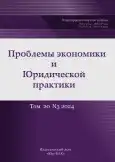The Principle of Inviolability of Housing as a Principle of Housing Law of the Russian Federation
- Authors: Kluychnikova Y.A.1
-
Affiliations:
- Financial University under the Government of the Russian Federation
- Issue: Vol 20, No 3 (2024)
- Pages: 70-74
- Section: Private Law (Civil) Sciences
- URL: https://bakhtiniada.ru/2541-8025/article/view/263751
- EDN: https://elibrary.ru/TPVQDA
- ID: 263751
Cite item
Abstract
In legal doctrine and practice, the principle of inviolability of the home guarantees everyone the protection of rights and interests, preventing unjustified and arbitrary interference in his private life and ensuring respect for his home. Any actions that may violate this principle must be clearly justified on legitimate grounds, such as the need to protect public order, and must be authorized by the competent authorities. It is necessary to include in Article 3 of the Housing Code of the Russian Federation a decoding of the concept of «housing», with an accurate list of objects that are understood by this concept. In addition, it is proposed to develop legally established rules for the owner and the right of the employer from illegal intrusion of the owner.
Full Text
##article.viewOnOriginalSite##About the authors
Yaroslavna A. Kluychnikova
Financial University under the Government of the Russian Federation
Author for correspondence.
Email: yaklyuchnikova@fa.ru
ORCID iD: 0000-0002-7794-4240
SPIN-code: 1098-9416
Cand. Sci. (Law), Associate Professor, Associate Professor of the Department of Legal Regulation economic activity of the Faculty of Law
Russian Federation, MoscowReferences
- Resolution of the Constitutional Court of the Russian Federation No. 11-P dated May 14, 2012 // Bulletin of the Constitutional Court of the Russian Federation. —2012. —№ 4.
- On some issues of judicial practice in cases of crimes against the constitutional rights and freedoms of man and citizen (articles 137, 138, 138.1, 139, 144.1, 145, 145.1 Criminal Code of the Russian Federation): resolution of the Plenum of the Supreme Court of the Russian Federation dated December 25, 2018 No. 46 // Bulletin of the Supreme Court of the Russian Federation. —2019. —№ 2.
- Ruling of the Judicial Board for Economic Disputes of the Supreme Court of the Russian Federation dated November 29, 2018 No. 305-ES18-15724 in case No. A40-67517/2017 // URL: https://kad.arbitr.ru / (date of appeal 05/01/2024).
- Definition of the Judicial Board for Civil Cases of the Supreme Court of the Russian Federation dated March 9, 2021 No. 18-KG20-120-K4 in case No. 2-46/2019 // https://vsrf.ru/stor_pdf.php?id=1980622 (accessed 01.05.2024).
- Ermakova O. V. The structure of the violation of the inviolability of the home: shortcomings of the legislative model / O. V. Ermakova // Altai Legal Bulletin. —2020. —№ 3(31). —Pp. 72–75.
- Kulik T. Yu. Withdrawal of the only habitable living space—trends in the development of court practice // Science and Technology Education: agriculture and economics; entrepreneurship; law and management. —2022. —№ 4 (143). —Pp. 141–145.
- Kuznetsov A. A. Actual problems of realization of the principle of the right of inviolability of the home / A. A. Kuznetsov, G. A. Tyupin // Trends in the development of science and education. —2024. —No. 105-7. —pp. 69–72.
- Lebedev N. Y. «Dwelling», «housing», «living quarters», «residential buildings»: on the need for uniformity of the concept of «housing» in the Russian branches of private and public law / N. Y. Lebedev // Modern trends in the development of private law, enforcement proceedings and methods of legal protection : Materials of the VII All-Russian Scientific and practical conference, St. Petersburg, November 25, 2021. —St. Petersburg: St. Petersburg Institute (branch) VGUY (RPA of the Ministry of Justice of Russia), 2021. —pp. 50–55.
- Mikheeva L., Galperin M., Yarkov V. et al. Executive immunity in relation to single housing: has the Constitutional Court cut the Gordian knot? // Law. —2021. —No. 5. —pp. 18–30.
- Morkhat P.M. Foreclosure on the sole housing of a bankrupt debtor: theoretical and legal aspect and analysis of judicial practice // Judge. —2020. —No. 9. —pp. 55–60.
- Ovchinko O. A. On the question of the concept of housing and penetration into housing in the context of ensuring the right to its inviolability / O. A. Ovchinko // Scientific component. —2023. —№ 2(18). —Pp. 52–59.
- Ovinnikov V. A. On the problem of defining the concept of «housing», and related concepts of «right to housing», «protection of housing rights» in housing law / V. A. Ovinnikov // Law and the state: theory and practice. —2022. —№ 1(205). —Pp. 287–290.
- Pushkina A.V. Guarantees of protection of the right to housing in sectoral legislation / A.V. Pushkina // Urban planning law. —2021. —No. 1. —pp. 31–35.
- Redkina E. A. Legal regulation of the right to inviolability of housing in modern Russian legislation / E. A. Redkina, M. V. Arkhipova // Problems of interregional relations. —2022. —No. 17. —pp. 74–78.
- Seniokiy A.V. The object of the right to inviolability of housing / A.V. Seniokiy // Crimean Academic Bulletin. —2021. —No. 19. —pp. 231–238.
- Tugutov B. A. Problems of executive immunity in relation to the sole residential premises of a debtor-citizen / B. A. Tugutov, E. M. Cenotrusova // Russian justice. —2023. —No. 8. —pp. 49–56.
- Yarovoy A.V. Protection of housing rights of citizens in case of alienation by the owner of a dwelling // Eurasian Law Journal. —2018. —№ 10 (125). —Pp. 133–135.
- Yarovoy A.V. Hiring of residential premises: realization of the constitutional right of citizens to housing / A.V. Yarovoy // Eurasian Legal Journal. —2022. —№ 10(173). —Pp. 250–251.
Supplementary files








